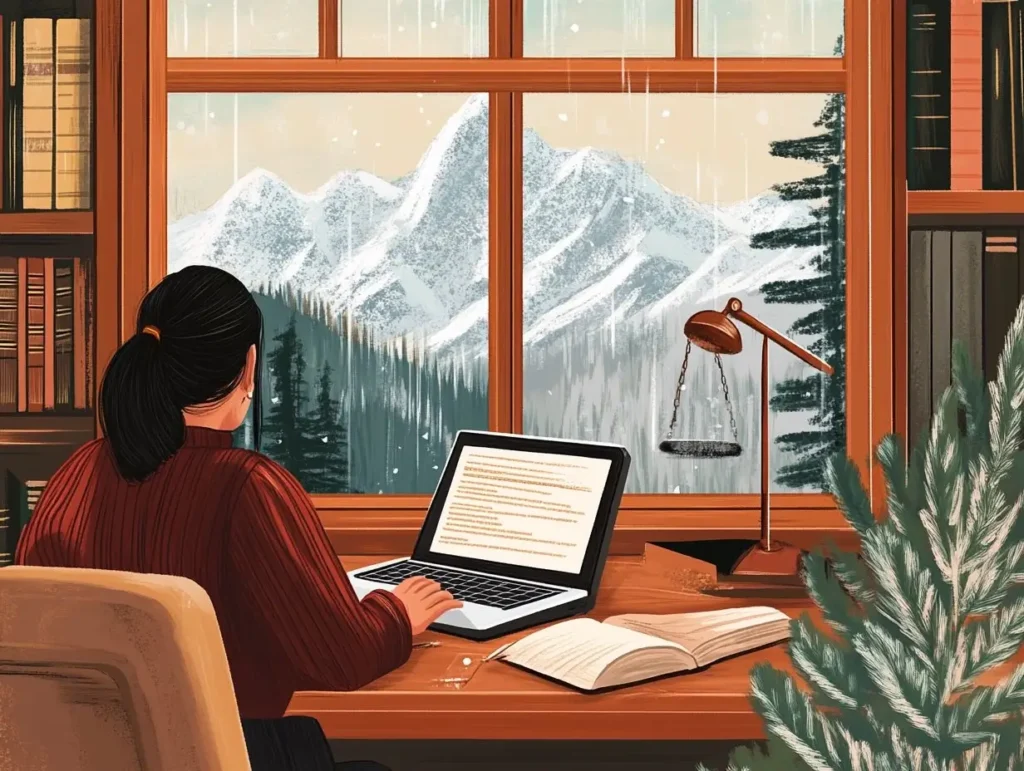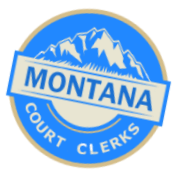Navigating the legal landscape in Montana can indeed be a challenging experience, particularly when it comes to looking up Montana court cases. This guide aims to provide clarity on the various types of courts in the state, outline the legal process, and offer insights on how to effectively look up court cases.
Whether you prefer utilizing online resources or opting for in-person methods, this Montana court case research resource encompasses all the information you need. Additionally, it addresses the limitations and privacy laws related to case access, along with practical tips to enhance the efficiency of your search.
Understanding Court Cases in Montana

Understanding court cases in Montana requires navigating the intricate legal system of the state, which includes various court types, such as the district court and the Montana state supreme court.
Whether one is a plaintiff or a defendant, accessing legal information through online databases and public records is essential for anyone involved in legal proceedings. Montana courts serve a crucial function in interpreting state laws, managing both civil and criminal cases, and ensuring that all citizens have access to justice.
Types of Courts in Montana
Montana’s court system is organized into several levels, including trial courts, appellate courts, and the supreme court, each fulfilling specific roles in the administration of justice.
At the most basic level, trial courts handle cases related to criminal offenses, civil disputes, family law, and probate matters, offering a direct venue for hearings and jury trials. For example, a district court may address serious felony charges or significant civil litigation, while justice courts typically deal with minor offenses or misdemeanors.
On the other hand, appellate courts examine decisions made by trial courts to ensure that legal interpretations align with state and federal law, often shaping the outcomes of future cases.
At the apex of this system is the Montana Supreme Court, which resolves crucial legal questions and ensures consistency throughout the judicial framework, thereby reinforcing the rule of law across the state.
Legal System and Process
The legal system in Montana is structured to ensure fair and efficient legal proceedings, covering everything from case filing to the litigation process that takes place in court.
As cases move through various stages—such as pre-trial motions, discovery, and trial—it is crucial to recognize the importance of case management in organizing evidence, timelines, and legal arguments. Court rules provide a framework that everyone must adhere to, which helps maintain order and clarity in often complex legal matters.
The roles of court clerks and attorneys are equally important in this intricate litigation process. While clerks manage case files and court calendars, attorneys focus on strategizing and advocating for their clients. These interconnected elements play a significant role in the outcomes of disputes, as effective management and strict adherence to regulations can be the deciding factor between a successful resolution and prolonged litigation.
How to Look Up Court Cases in Montana
Researching court cases in Montana necessitates a good understanding of various resources. This includes Montana FOIA requests, online databases and public access tools specifically designed for efficient legal research and case tracking.
Online Resources

Online resources are incredibly valuable for anyone looking to research court cases in Montana, offering access to a vast array of legal information, including court documents and updates on case statuses.
Among the most notable platforms is the Montana Court System website, which features a comprehensive case search tool. Additionally, the Montana Secretary of State’s office maintains important legal filings that can be quite useful. For federal case information, individuals can also explore PACER, though there is a small fee associated with that service.
To make the most of these resources, it is advisable to use specific case numbers or party names for a more accurate search. Many of these platforms are designed with user-friendly interfaces that facilitate easy access to trial dates, rulings, and other essential documents. This ensures that both legal practitioners and individuals can efficiently track their cases.
In-Person Methods
In-person methods for researching court cases in Montana include visiting law libraries, interacting with court clerks, and accessing public records directly at courthouse facilities.
These approaches provide a practical way to navigate the complex landscape of legal documents. Court clerks play a crucial role in this process, serving as valuable resources for individuals seeking assistance. They can guide you on where to find various types of public records, such as case files, judgments, and dockets.
When you plan to visit a courthouse, it’s advisable to prepare in advance by gathering relevant details about the case, such as the names of the parties involved or the case number. This preparation allows for a more efficient search. Additionally, being courteous and patient with the clerks can significantly enhance the experience, as they may be more willing to assist you in uncovering valuable legal resources.
Limitations and Restrictions
It is essential to understand the limitations and restrictions surrounding court cases in Montana for anyone looking to navigate the legal landscape.
This is particularly important when it comes to privacy laws and public access to court documents.
Types of Cases Available to the Public
In Montana, the public can access certain types of cases, which includes a variety of civil and criminal matters, promoting transparency in the judicial process.
This openness covers several civil issues, such as family law disputes, property disputes, and contract matters, in addition to criminal cases that range from felonies and misdemeanors to traffic violations. For instance, individuals can obtain records related to divorce proceedings or small claims cases, as well as more serious offenses like robbery or assault.
The importance of allowing public access to these judicial rulings lies in fostering accountability and promoting trust in the legal system. This ensures that community members are informed about legal proceedings that affect their lives and helps uphold the principles of justice.
Privacy and Confidentiality Laws

Montana’s privacy and confidentiality laws play a crucial role in protecting sensitive information within judicial records, balancing the need for public access with individual rights.
These laws specifically safeguard personal identifiers, such as Social Security numbers, health information, and details about minors, ensuring that sensitive data remains appropriately protected from unnecessary exposure. Legal professionals must navigate these regulations with care, as mishandling protected information can lead to ethical dilemmas and potential legal consequences.
While these laws aim to uphold personal privacy, they can also present challenges to transparency within the judicial system. Striking a delicate balance is essential, as unrestricted access to judicial records is vital for informing the public and promoting accountability, thereby reinforcing the fundamental principle of access to justice for everyone.
Tips for Effective Case Search
Conducting effective case searches in Montana necessitates a strategic approach to search criteria, alongside a clear understanding of the information required. This can be achieved by utilizing online tools or by consulting court schedules.
Using Keywords and Filters
Utilizing keywords and filters in legal case searches can greatly enhance the effectiveness of legal research, making it much easier to locate relevant information through various databases and online platforms.
By thoughtfully selecting terms that directly relate to the core issues of a legal matter, individuals can refine their searches and achieve more precise results. For example, combining specific legal terms like “breach of contract” with contextual filters, such as “2019” or “California,” enables a more targeted citation lookup that aligns closely with the user’s needs.
Likewise, in criminal cases, blending keywords such as “misdemeanor” with geographic locations or pertinent statutes can streamline case tracking, ensuring that critical information is not overlooked. When the appropriate filters are applied, what may seem like a daunting search can transform into an efficient and effective process.
Understanding Legal Terminology
A solid understanding of legal terminology is crucial for anyone involved in case searches, as it aids in deciphering case summaries, court rulings, and other judicial decisions.
Familiarity with key terms such as “plaintiff,” “defendant,” and “precedent” can significantly enhance the ability to interpret complex legal documents. This knowledge enables individuals to navigate litigation with greater confidence, as they become skilled in understanding the fundamental principles that influence court decisions.
Having this comprehension not only helps in grasping the context of specific cases but also assists in predicting potential legal outcomes. Consequently, anyone engaged in legal research or proceedings is better positioned to assess information critically and contribute meaningfully to discussions and analyses regarding the case at hand.

Frequently Asked Questions
Can you look up court cases in Montana?
Yes, court cases in Montana can be accessed through the state’s online court records system.
What types of court cases can I search for in Montana?
You can search for both civil and criminal court cases in Montana.
Is there a fee to look up court cases in Montana?
Yes, there is a fee to access court case records in Montana. The fee varies depending on the type of case and the length of the record.
Can I search for court cases in Montana by case number?
Yes, you can search for a specific court case in Montana by using the case number.
How far back can I search for court cases in Montana?
The online court records system in Montana contains cases dating back to the 1990s. For older cases, you may need to visit the county courthouse where the case was filed.
Are all court cases in Montana available to the public?
No, some court cases may be sealed or restricted from public access. These cases typically involve sensitive or confidential information.
